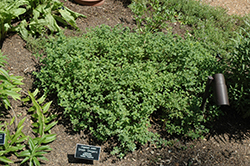It's all about ...
plants

Plant Height: 16 inches
Flower Height: 24 inches
Spacing: 12 inches
Sunlight:
![]()
Hardiness Zone: (annual)
Other Names: Cretan Oregano, Turkish Oregano, Pot Marjoram
Description:
This variety is noted for its wonderful flavour and aroma; does well in sandy loam, good heat and drought tolerance; a noteworthy addition to the herb garden for its culinary attributes; also attractive in containers
Edible Qualities
Greek Oregano is an annual herb that is commonly grown for its edible qualities, although it does have ornamental merits as well. The fragrant round green leaves which emerge chartreuse in spring are usually harvested from late spring to early summer. The leaves have a pleasant taste and a distinctive fragrance.
The leaves are most often used in the following ways:
- Cooking
- Seasoning
Planting & Growing
Greek Oregano will grow to be about 16 inches tall at maturity extending to 24 inches tall with the flowers, with a spread of 14 inches. When grown in masses or used as a bedding plant, individual plants should be spaced approximately 12 inches apart. Its foliage tends to remain dense right to the ground, not requiring facer plants in front. Although it's not a true annual, this fast-growing plant can be expected to behave as an annual in our climate if left outdoors over the winter, usually needing replacement the following year. As such, gardeners should take into consideration that it will perform differently than it would in its native habitat.
This plant can be integrated into a landscape or flower garden by creative gardeners, but is usually grown in a designated herb garden. It should only be grown in full sunlight. It prefers dry to average moisture levels with very well-drained soil, and will often die in standing water. It is considered to be drought-tolerant, and thus makes an ideal choice for a low-water garden or xeriscape application. It is not particular as to soil type or pH. It is somewhat tolerant of urban pollution. This species is not originally from North America.
Greek Oregano is a good choice for the edible garden, but it is also well-suited for use in outdoor pots and containers. It can be used either as 'filler' or as a 'thriller' in the 'spiller-thriller-filler' container combination, depending on the height and form of the other plants used in the container planting. Note that when growing plants in outdoor containers and baskets, they may require more frequent waterings than they would in the yard or garden.
